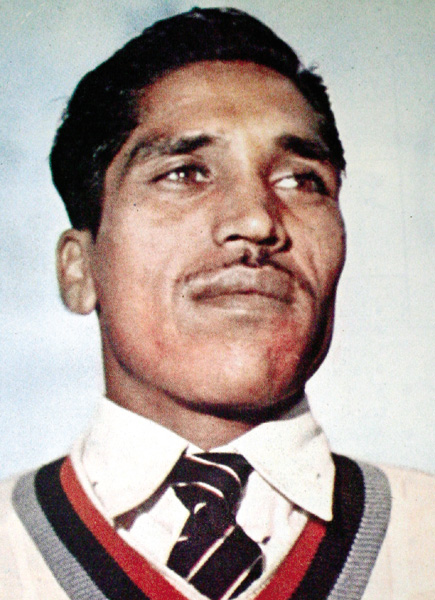
Article and Photo taken from 'Great Indian Olympians' by Arumugam and Ezeikel
 he
venue is Tokyo, the year 1964, the date 23rd October and the
occasion, the Olympic hockey final between defending champions Pakistan
and 6-time winner India.
he
venue is Tokyo, the year 1964, the date 23rd October and the
occasion, the Olympic hockey final between defending champions Pakistan
and 6-time winner India.
The atmosphere is tense, and is becoming
increasingly thrilling with each passing minute. Initially a physical
one, the match slips into classic artistry, with both sides sweating
blood to score a goal or prevent it from occurring against them.
As a true index of the fight, halftime ends with a blank scoreboard. Five
minutes into the resumption of play, India tastes a goal. A penalty
corner hit leads to a penalty stroke which Mohinder Lal flicks past the
diminutive Abdul Hadi, the Pakistan keeper.
This goal ignites a fire in Pakistan's belly. Its free-flowing forwards press
hard. Relentless attacks and counter attacks mark this spell. The crowd
witnesses the finest exhibition of an attacking brand of hockey, the
trait that led both the giants to this summit clash.
Another twenty
minutes lapse, with the ball swinging from one circle to other. India
still holds on to the slender lead.
When only ten minutes remain,
Pakistan becomes desperate. There emanates from the Pakistani half Tsunami-like surges
from its fleet-footed forwards, led by irresistible Mhd. Afzal. The two
lions (Singhs) in the Indian defence - Gurbux and Prithipal - prevent
any goal from being scored against their team, but not before giving away a
plethora of penalty corners.
Every time the awe-evoking Munir Dar
unleashed his lightening penalty corner shots, the Indian custodian rose to the task. He
put a leg to kick it off, or applied the stick to deflect it in the
nick of time. The goalkeeper, cool and collected, blunted even the most
furious of shots with an hawkish eye, immense concentration and
anticipation. Dar's drives and Afzal's goal-bound moves were held in
check by the cool authority of the goalkeeper.
As a result the equaliser eludes Pakistan and as the final whistle is
blown, India's moment of glory returns. The victors in the field, the
eleven excited grey-blue-jersey wearing Indians, rush to the circle and
lift the goalkeeper in a frenzy. The stocky goalkeeper Shankar Laxman is the hero
of the day.
Hockey Circle, a journal of repute, observed: "Pakistan fought well
but veteran keeper Shankar Laxman saved brilliantly a penalty corner
shot. There were other shots and other saves, for Laxman, the ball was
the size of a football. It was his afternoon of glory and fame."
Harbinder Singh, the flying centre forward who played first
of his three Olympics at Tokyo, reminisces vividly, "Everybody recalls
the Tokyo Olympics by the goal that Mohinder Lal scored in the final.
But I think the real hero was Shankar Laxman. His was simply great
goalkeeping. He was just unbeatable during the last ten-fifteen minutes
when Pakistan had many penalty corners, and there were five to six
rebounds. Mind you, there were no chest guards and helmets during those
days; just the pads and the stick."
Harbinder's words deserves mention
because he knew the exact intensity of attack India had to sustain for
its gold. He stood behind the Indian net for about five minutes in the
first half when Shankar Laxman had to be treated for a minor injury.
Tokyo was Laxman's third Olympics. His feats in the two previous
appearances too were no less exciting. At Melbourne in 1956, Ranganathan
Francis, a refugee from Burma, settled in Chennai, was hailed as the
world's best goalkeeper, but he was rested for the final and the 23-year
old Shankar Laxman, who was in his first Olympics, was preferred.
At Rome four years later, younger Chinnadorai Deshmuthu was the other goalkeeper
with Laxman. Here too Laxman played the final, not the younger one.
Its not just appearances
but also the achievements that need eulogy. In all the three Olympic
finals, all against the same rival (Pakistan), the outcome was decided
by a lone goal. In the 1956 and 1964 Olympics, no Pakistan forward could
send a shot past Laxman, unlike what Naseer Bunda did at Rome in 1960.
After the 1964 Tokyo Olympics, Shankar Laxman was invited to lead India in the
1966 Asian Games. Thus, he became the first hockey goalkeeper in the
world to lead his country.
In all Shankar Laxman played three Olympics (1956, 60, 64) and three Asian games finals
(1958, 62, 66), all
against Pakistan. In four of the six finals, he did not allow any goal
for the rival. In the remaining two, he conceded only three goals. Six
finals and three goals conceded, must rank a wonderful record for any
goalkeeper.
Fittingly he received the Arjuna award after the 1964 Tokyo
Olympics gold, and Padma Shree after the 1966 Bangkok Asian Games gold, to
become the only goalkeeper to be honoured so.
The significance of Shankar Laxman's role in
India's glorious legacy was felt in his absence too. After he hung
up his boots, no India goalkeeper survived the rigours of three Olympics. The fall
of India's fortunes in the next Olympics (1968), where for the first
time India failed to clear the semi-finals, could be traced to absence of
a goalkeeper in the mould of Shankar Laxman. India lost the semifinal to
Australia at Mexico City in the 1968 Olympics.
The book Great Indian Olympians can be purchased on
Amazon.in.
![]()